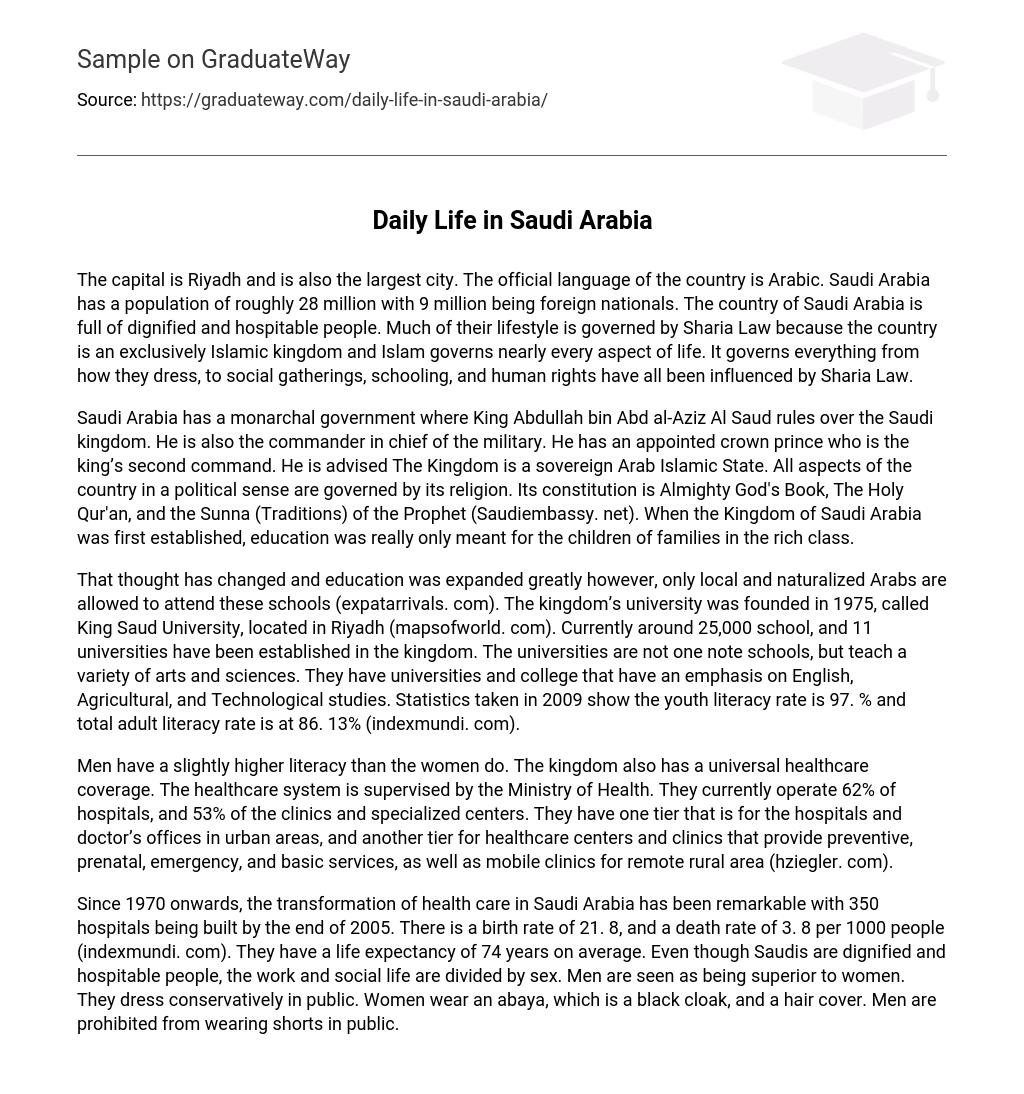The capital and largest city of Saudi Arabia is Riyadh. The country has a population of around 28 million, including 9 million foreign nationals. Arabic is the official language spoken in Saudi Arabia. The people are renowned for their dignified and hospitable nature. Sharia Law holds great importance in different aspects of life as Saudi Arabia is an entirely Islamic kingdom where Islam affects areas such as attire, social events, education, and human rights.
Saudi Arabia is a sovereign Arab Islamic State governed by a monarchy. King Abdullah bin Abd al-Aziz Al Saud serves as the ruler and commander in chief of the military, with a crown prince appointed as his second-in-command. The country’s political governance is influenced by its religion, with the constitution based on Almighty God’s Book, The Holy Qur’an, and the Sunna (Traditions) of the Prophet (Saudiembassy.net). Initially, education in Saudi Arabia was predominantly accessible to affluent families.
The education system in Saudi Arabia has undergone significant growth and development over time.
However, it is worth noting that only local and naturalized Arabs are allowed to attend these schools (source: expatarrivals.com).
One notable educational institution is King Saud University, which was established in 1975 and is situated in Riyadh (source: mapsofworld.com).
This university serves as the primary higher education institution in the kingdom.
Currently, there are around 25,000 schools and 11 universities operating throughout the country.
These universities offer a wide range of programs specializing in arts, sciences, English studies, agriculture, and technology.
According to statistics from 2009, the youth literacy rate stands impressively at 97%, while the overall adult literacy rate reaches 86.13% (source: indexmundi.com).
According to hziegler.com, men have a slightly higher literacy rate than women in the kingdom. The Ministry of Health oversees universal healthcare coverage which includes hospitals and clinics. Currently, the Ministry operates 62% of hospitals and 53% of clinics and specialized centers. Their healthcare system consists of two tiers: one for urban hospitals and doctor’s offices, and another for healthcare centers and clinics that offer preventive, prenatal, emergency, and basic services. Additionally, they provide mobile clinics to serve remote rural areas.
According to indexmundi.com, healthcare in Saudi Arabia has undergone significant changes since 1970, resulting in the establishment of 350 hospitals by 2005. The country’s birth rate is 21.8 per 1000 people and the death rate is 3.8 per 1000 people. The average life expectancy is 74 years.
In Saudi Arabia, despite their reputation for dignity and hospitality, there exists noticeable gender-based segregation between work and social life, with men being considered superior to women. In public settings, both genders adhere to conservative dress codes: women wear an abaya (a black cloak) and head covering while men are not allowed to wear shorts. There is cultural encouragement to cover up and show less skin.
In Saudi Arabia, women have historically encountered inequalities and restrictions in comparison to men. They were traditionally required to stay quiet and invisible, while men enjoyed more advantages and liberties. Nevertheless, there has been progress in recent times. In the previous year, it was declared that women would ultimately be granted the right to vote, participate in elections, and occupy positions in the consultative assembly. Despite these advancements, sexism continues to endure. Even though female lawyers are now permitted to advocate for women in family matters, the testimony of two women is still regarded as equivalent to that of one man.
In Saudi Arabia, the government’s inclination towards censorship is reflected in their prohibition on women driving. Despite being known for their hospitality and dignity, the Saudi people face significant restrictions on basic freedoms such as speech, press, assembly, religion, and association. The Ministry of Information monitors television and radio broadcasts while criticism of the government or royal family is discouraged. The media usually ignores statements that are deemed anti-government or anti-religious. Moreover, practicing religions other than Islam is illegal in the country.





